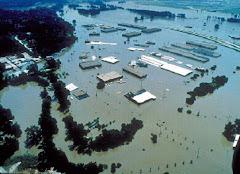Global Warming is a term denoting a gradual warming of the Earths average temperature. The term has become synonymous to the Earths warming exclusively due to man-made effects, especially carbon dioxide.
Carbon dioxide concentrations have increased from 300 parts per million to 384 parts per million since 1900, with the most accelerated increase during the past 40 years.
Some scientists have drawn the conclusion that the increase in the Earths average temperature (about 1°F since 1975) is essentially solely based on man-made activities such as the burning of fossil fuels, biomass burning, and deforestation.
Causes of Global Warming
The Earths atmosphere is made up of different gases. Nitrogen makes up 78% of the total composition, Oxygen 21%, Argon 1% and traces gases .1%. Carbon dioxide makes up most of the volume of the rare gases. Water vapor varies from almost 0% over the deserts to 4% over the oceans.
Water vapor, carbon dioxide, methane, ozone, and nitrous oxide are the gases of interest since these are the greenhouse gases. Greenhouse gases can reradiate heat or trap heat absorbed by the Earth from the sun. Water vapor is by far the largest mechanism for heat retention out of the greenhouse gases.
In the past, the Earths orbital eccentricity, variance of the tilt and wobble have led to periods of warmer weather. Even though the solar energy from the sun is considered a constant, a slight change could cause temperature fluctuations. Recently, Mars has also shown a decrease in ice coverage without greenhouse gas changes. The cause for the reduction in aerial coverage is unknown.
In summary, there are three mechanisms which would cause global warming, or in other words allow for a warming of the Earths average temperature. These are:
(1) solar energy variance,
(2) gradual changes in the Earths orbit, tilt, and wobble, and
(3) greenhouse gas changes.
It is difficult to calculate what percentage of the recent warming could be attributed to human activities. We can eliminate changes in the Earths orbit, tilt, and wobble causing a temperature increase since these are long term effects.
What are the Effects of Global Warming on Hurricanes?
There is a common misconception that since the global temperature has increased, hurricanes also must increase in number and intensity. The primary factor in the ability of a hurricane to strengthen or weaken is the wind shear profile of the atmosphere - not water temperature. It always has been warm enough in the tropics to produce hurricanes. This temperature equates to a sea surface temperature of about 80°F.
If you study the behavior of hurricanes you can find cases where hurricanes have strengthened over cooler water and have weakened over warmer water. There may be a small "boost" to a hurricanes strength as it moves over the Gulf Stream, if upper air wind profiles do not change much. Some of the computer generated hurricane models have this bias built in and will rapidly strengthen a tropical cyclone if predicted to go over a warm pool of water.
The recent upturn in tropical cyclone activity was predicted long before Global Warming became a household name. The tropical
Atlantic has been known to vary in cycles, and this recent upturn was expected. If you were to compare the period from 1900 to about 1950, with the 1950s until now, you would find an actual decrease in the average number of hurricanes and their intensity. It also is noted that the upswing in hurricane numbers over the past ten years or more has been only in the North Atlantic basin. Other hurricane formation regions have not shown this same trend.
The Effects of Global Warming on Hurricanes: Summary
There has been a noted increase in the number of hurricanes in the Atlantic Ocean, Caribbean Sea, and Gulf of Mexico since the mid-1990s. The long term average is that ten tropical storms will form per year,
of which about six will become hurricanes. Since the mid-1990s the average has been fifteen tropical storms, of which eight have become hurricanes. There has also been an upward trend in the concentration of the greenhouse gas carbon dioxide
due to mans activities over the past 100 years. During this time, hurricanes have gone through cycles where they have been more numerous, such as the cycle that we are in now. Some scientists have drawn a one to one correlation between the Earths temperature increase and the number of hurricanes and their intensity.
As we have noted, the number one factor in tropical cyclone intensity is related to the atmospheric wind shear profile. There is even some research that suggests that higher temperatures could actually increase the wind shear profile resulting in a decrease in hurricane activity.
The upward cycle in hurricane numbers is expected to continue for several more years. If this trend were to continue for a considerably longer period, only then could one draw a conclusion that warmer temperatures have played some part to cause an increase in tropical cyclone formation.
Article Directory: http://www.articledashboard.com

